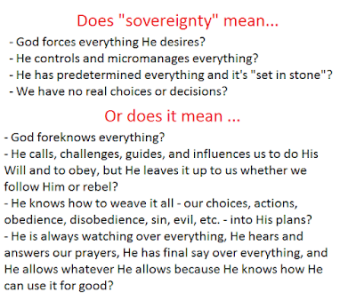Johann
Active Member
The Bible says ... Jesus died for all, loves all, and wants all men to be saved.okay and ? In case you weren't aware, the elect are scattered around the world. Duh
But Calvinism says ... Jesus died only for the elect, loves only the elect, and only wanted the elect to be saved.
John 3:16-17: "For God so loved the world that he gave his one and only Son, that whoever believes in him shall not perish but have eternal life. For God did not send his Son into the world to condemn the world, but to save the world through him."
[Calvinist version: "The world/whoever" means "mankind/the elect from all over the world." Most of us would think - and rightly so - that this verse is an instruction on how anyone can be saved, that anyone who believes will be saved. But in Calvinism, it's not an instruction on how to be saved because not everyone can be saved; it's merely a statement informing us of how the elect are saved: the elect will believe and not perish.]
John 5:24: "... whoever hears my word and believes him who sent me has eternal life and will not be condemned ..." [Calvinist version: Only the elect can "hear and believe," and so only they will be given eternal life. Once again, not an instruction, just a statement.]
Titus 2:11: "For the grace of God that brings salvation has appeared to all men." [Calvinist version: But only the elected people will be able to see that grace and accept that salvation. Sure, it "appears" to the non-elect, but they can't see it because God blinds their eyes and hardens their hearts because He predestined them to hell. (Question: Why would God need to blind and harden people that were created to be unable to see and believe from the very beginning anyway?)]
1 Corinthians 15:22: "For as in Adam all die, so as in Christ all will be made alive." [Calvinist version: Calvinists assume that the "in Christ" people are those predestined to be saved. However, Ephesians 1:13 tells us how we become "in Christ: "And you also were included in Christ when you heard the word of truth, the gospel of your salvation. Having believed, you were marked in him with a seal, the promised Holy Spirit." It's not that there are elected people God predestined to save and causes to believe; it's that anyone who believes becomes "in Christ" and will be saved. Once we believe, and anyone can, we become part of the "in Christ" group, the group that God predestined to take to heaven. God chose the destination of the "in Christ" group, but we choose whether to be part of that group or not.]
1 Timothy 2:3-6: "This is good, and pleases God our Savior, who wants all men to be saved and to come to a knowledge of the truth. For there is one God and one mediator between God and men, the man Jesus Christ, who gave himself as a ransom for all men ..." [Calvinist version: Just because God wants all men to be saved doesn't mean that all men can be saved, and "a ransom for all men" really just means "for all kinds of men, for mankind, for all the elect."]
1 Timothy 4:10: "... that we have put our hope in the living God, who is the Savior of all men, and especially of those who believe." [Calvinist version: Once again, "all men" doesn't mean that salvation is actually available to all individual people, just to all kinds of people, the elect from all nations. However, it would be quite redundant if "all men" and "those who believe" both mean "the elect": "... who is the Savior of the elect, and especially of the elect."]
Romans 5:18: "Consequently, just as the result of one trespass was condemnation for all men, so also the result of one act of righteousness was justification that brings life for all men." [Once again, Calvi-Jesus didn't die for "all men," just for "all kinds of men, mankind." But non-Calvi-Jesus (Jesus as seen in the Bible when read plainly and clearly) died for everyone's sins, to justify us all and offer all of us eternal life. But we choose to accept it or reject it.]
Romans 10:13: "Everyone who calls on the name of the Lord will be saved." [Calvinist version: "Everyone who calls" doesn't mean everyone can call. "Everyone who calls" means only the elect because only the elect can/will call on the Lord.]

Why is Calvinism so dangerous? #1 (Jesus died for whom?)
[In this series, I'm breaking the long post "Why is Calvinism so dangerous?" into bite-sized pieces.] 1. The Bible says ... Jesus di...
This first point alone is all you need to see how twisted and destructive Calvinism is.
To make Scripture fit their view, Calvinists say that "all men" and "whosoever" and "the world" really mean "just the elect" or "all KINDS of people" ... but not ALL individual people. Lots of verses to twist. If it was just one verse, I could be more understanding of them getting it wrong. But it's many. Scripture repeatedly, consistently tells us Jesus died to save all, that He paid for all men's sins so that all could live. And then Calvinists go and repeatedly, consistently twist each verse to mean "only the elect, from all nations."
[However, Calvinists misinterpret our belief of "Jesus died for all men, to save all people," accusing us of saying "all people will be saved," of universalism. But that's not what we're saying. We're saying He died for all men's sins to offer all men eternal life, but we have to choose if we will accept it or reject it. But since Calvinists think we don't get a choice, that we can't reject Jesus's sacrifice, and that Jesus died only for those going to heaven (the elect), they think we're saying "all people are going to heaven" when we say "Jesus died for all people." And since all people clearly don't go to heaven, then it must mean (in Calvinism, according to their presuppositions) that Jesus didn't die for all. And so when the Bible says "all men," they reinterpret it as "the elect." What a mess it makes when you deny the biblical truth of free-will, that God gave us all the right and responsibility to decide if we want Jesus as Lord and Savior, or not!]
But look at the verses above, without twisting them or reading into them. Does "all" sound like "only some" in these verses? Or does it only sound like "only some" when read with the presuppositions that only the elect can be saved and that people don't get a choice about Jesus?
Be aware: To make Calvinism appear biblical, Calvinists will often say "God loves everybody," but what they mean (and will say, when pushed) is that He actually has two different kinds of love. He has a saves-your-soul-because-Jesus-died-for-you kind of love for the elect and a Jesus-didn't-die-for-you-but-God-gives-you-food-and-water-on-earth kind of "love" for the non-elect before they're sent to hell for eternity for being the unbelievers He created them to be. (They also call this "grace," two different kinds of grace, so that they can say "See! God is gracious to all, even the non-elect.")
Wow ... if that's "love," I'd hate to see hate!
Go ahead and ask them. Ask a Calvinist who says "God loves everybody" how they can say something like that if He predestines the non-elect to hell, and see what they say. And then ask them to find you a verse - just one verse - that clearly teaches "two different kinds of love: one for the elect and one for the non-elect."
Because in my Bible, God Himself tells us how He shows His love for sinners, Romans 5:8: "But God demonstrates his own love for us in this: While we were still sinners, Christ died for us." Are we not all sinners? I'd say we all are, so therefore Jesus died for all of us. But if Jesus died only for the elect, not for the non-elect, then wouldn't that mean that only the elect are sinners? And at what point were the elect "still sinners" if they (according to Calvinism) were really saved since before time began, always set apart as God's "elect" before they were even born? It's really just a (false) formality to say that the elect were ever sinners or separated from God if they were never really lost or on their way to hell at any point in time, if they were created as saved, like Calvinism says.
Calvinism doesn't make sense. And it's very deceptive.
So don't trust them when they say "God loves all people." They do not believe God loves all people the same way, in a salvation kind of way. God only loves the elect enough to send Jesus to die for them, to give them salvation. Everyone else has to settle for mashed potatoes and gravy.
You just did what the article said you would.
J.


